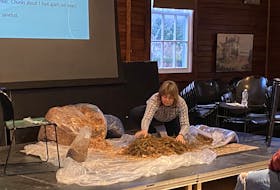SUMMERSIDE, P.E.I. — After a cruel act nearly ended his life, a dog named Ritz is one step closer to finding a forever family.
In October 2019, Ritz was living in Texas when he was shot and left for dead on the side of the road.
Eventually, someone found him and brought him to Hand-Me Down Hounds in San Antonio, Texas. He spent a year getting medical care and physical therapy before coming into the care of Nova Scotia-based Save a Life Canada Animal Rescue Society.
Jo-Anne Praught of Summerside was touched when she saw a photo of Ritz and read his story.
“I wanted to help,” she said.
Praught applied to foster the dog in November. Early December, she was told she was selected; Ritz arrived at her house a few days before Christmas.
“We’d often say … ‘Oh, I wish we had a foster for the holidays’,” said Praught. “When I heard that Ritz was coming, we were very excited.”
It’s not uncommon for fosters to be initially timid, she said, but Ritz fit right in from day one.
Despite his disability, he’s very much like other dogs. He lies around the house. He goes for walks. He plays with toys.

He’s not much of a barker. It sounds more like a squeak, which Praught thinks might be from his injury.
He loves meeting new people and dogs – even if those other dogs are a little afraid of his chair. People, meanwhile, tend to smile at Ritz when they see him out and about.
“He is so very funny, but he is very lovable,” said Praught.
Ritz isn’t Praught’s first foster dog, and he’s unlikely to be the last.
She began fostering dogs nearly a year ago. Her last dog passed away in March, and fostering was a way to get her “dog fix” while helping keep pets out of the shelter while they waited for a permanent home.
It’s “hard to let them go” when they get adopted, Praught said, but she hasn’t had any foster fails – adopting a foster – yet.

Since deciding to foster, she’s had three aside from Ritz. Ritz and one other were fostered through SALCARS.
SALCARS is a non-profit rescue group that focuses on clearing kill shelters in the United States and Canada. They have partnerships with groups outside of the Maritimes, like the Montreal SPCA and Texas’ Hand-Me Down Hounds.
Upon coming into SALCARS’ care, dogs spend at least two weeks with a foster family. According to the spokesperson, this is so the organization, “can get to know the dogs better and see what kind of home environment they would truly excel in.”
Ritz, meanwhile, has been with Praught for over a month and he’ll likely be with her a few weeks longer. He’s waiting on a surgery, to neuter him and remove a tooth, and a new wheelchair to help him get around.
Five facts about SALCARS
- Began five years ago to clear kill shelters across Canada and the United States
- Partnerships with rescues in Quebec, Ontario, British Columbia and Korea
- Will soon have partnerships with rescues in Egypt and Mexico
- Takes in surrenders from the Maritimes
- Has saved over 900 lives and counting
Out for a Stroll
Although Ritz loves going for walks, he can’t go very far in his wheelchair. Praught, wanting to take him out further, set out in search of a stroller to take him around in.
One commenter to her social media post, Conrad Perry, said he’d be willing to pitch in $20 to help buy Ritz a brand-new stroller if need be. His wife followed suit, offering another $20.
“We’re big dog people,” said Perry. “When I see a story like that, where somebody’s looking after a dog that has issues and needs the extra special care, I have no issue with donating a few dollars to help the situation.”
After Perry’s offer came other people willing to donate from across Atlantic Canada and Ontario.
In total, she raised over $1,500. With the money, she bought Ritz his stroller. She also bought him a new jacket, since he can’t regulate his body temperature well.
Praught donated the leftover money, $1,150, to SALCARS to help offset the cost of his surgery and new wheels.
“I’m just overwhelmed and grateful,” she said.
The day the stroller arrived, Praught wasted no time before taking Ritz out and about.
“I was just thinking how much this opens up his world, and how many more things we can do,” she said. “It’s just beyond words.”
Although fostering a dog who can’t use his back legs comes with its own set of challenges, Praught said those challenges aren’t harder than with any other dog: just different.
“I will admit the first week … in my head, I was thinking, ‘wow, I’m not really sure what I got into’,” she said. “But soon after that, it was really good.”
With Ritz, figuring out his routine was one challenge. She also learned he likes to lay on one side, so she has to flip him over from time to time so he doesn’t get sores.
“He can be a little bit stubborn on that,” she said, “so when I put him on one side, he’ll flip back over to the other.”
Another thing Praught has learned since fostering Ritz is that people and animals are very adaptable.
Ritz had a tough experience with people in the past, but his history hasn’t affected how he reacts to people today.
For anyone who might be thinking of taking on a foster dog, Praught said, “just do it.”
“It’s hard to give them up in the end, but it’s really rewarding,” she said. “It takes a little bit of getting used to, but every foster that I have, I think of them as my own until they’re not my fosters anymore.”
Kristin Gardiner is the Journal Pioneer's rural reporter.








